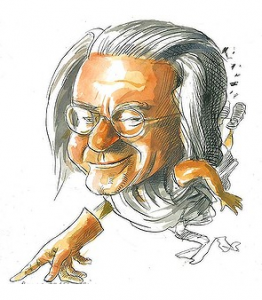
This last weekend I listened to an interview with “teacher of philosophy” A. C. Grayling. (He is not a philosopher, he says: that label belongs to names like Aristotle and Socrates.) He was discussing his new book, The Good Book, which sounds cheeky enough, but which I learned was really both a very good idea and a book I will soon buy and read.
I heard that the book is popular enough to be used even by some couples getting married as the book on which they make their vows.
I knew of A. C. Grayling from his other books on philosophy, and in particular for his contribution to the”New Atheist” onslaught against religion. But there is no substitute for hearing the guy live in an interview — except having time and opportunity to grill him yourself, no doubt. His self-effacing jokes against philosophers serve as a lovely wine and appetizer before the meal. (He is taught by his wife when she tells him “Be philosophical about it: don’t think about it.”)
One thing I liked about his book, The Good Book, as he explained it, was that it was not — as many fear mongers have declared — an attack on religion or the Bible. (He has done that in other venues, as in his Against All Gods.) This is a positive, healthy alternative to the Bible. It is a series of statements –the great thoughts — of Spinoza, Hume, Plato, Aristotle, all the wise of the East (China) and the West. It takes the best of the Bible, its handy division into chapters and verses, and applies them to the best thoughts of humanity –the thoughts that give us the best guide about how to think and live with ourselves and others.
But the thoughts are not diktats on what you must do, but guides and principles to help us think and live humanely.
The interview begins with a discussion of the two sources of moral maxims. The triad of great religions today — Islam, Judaism and Christianity — are prescriptive, edicts from a God above. The humanist and atheist maxims are taken from those who see humankind as the source and guide to all that we need in order to live well. It’s an interesting discussion.
Grayling’s book has been criticized for not footnoting the sources of all the sayings. He says this is because he wants people to focus on the idea, not on the history or provenance of it.
In response to those who complain that we don’t need a book like this — why another Bible? why not let us just think for ourselves? — Grayling responds that it is not necessary, agreed, but that some people who are interested in exploring other ideas and their own in the light of what others have said, then those people may find it of some use.
The Good Book on the U.S. Amazon site.
The Good Book on the U.K. Amazon site.
Listen Now to the interview at the Sydney 2011 Writers’ Festival
Sydney Morning Herald article on The Good Book
Sydney Writers’ Festival ABC page with podcasts.
I might have had more to say but a police constable interrupted my listening to the car radio interview by pulling me over for a random breath test.
If you enjoyed this post, please consider donating to Vridar. Thanks!

A small typo: the link you posted for the US amazon site is wrong, it points to the Sydney Morning Herald article.
Thanks. Fixed. Curious to note the different subtitles in the UK and US editions.
Neil
ABC Radio National has its faults. far too many of them.
But those few days when it covered the Sydney Writers’ Week [or however long it was] it showed the value of in-depth, informative coverage of intelligent people talking to intelligent people about important topics.
Good stuff.
We listened to the climate change coverage with Naomi Oreskes [you have to read her book “Merchants of Doubt”], the Palestinian Izzeldin Abuelaish appealing for humanity so powerfully [people were in tears apparently] , the porn debate with the American academic Gail Dines, A.C. and his humility, humour and insight and lots of other fascinating people.
A winning performance by the ABC, restores some of my faith in our national broadcaster.
Some.